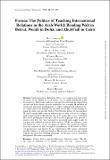Files in this item
The politics of teaching International Relations in the Arab world : reading Walt in Beirut, Wendt in Doha, and Abul-Fadl in Cairo
Item metadata
| dc.contributor.author | Darwich, May | |
| dc.contributor.author | Valbjørn, Morten | |
| dc.contributor.author | Salloukh, Bassel F | |
| dc.contributor.author | Hazbun, Waleed | |
| dc.contributor.author | Samra, Amira Abu | |
| dc.contributor.author | Saddiki, Said | |
| dc.contributor.author | Saouli, Adham | |
| dc.contributor.author | Albloshi, Hamad H | |
| dc.contributor.author | Makdisi, Karim | |
| dc.date.accessioned | 2022-05-10T09:30:09Z | |
| dc.date.available | 2022-05-10T09:30:09Z | |
| dc.date.issued | 2021-11 | |
| dc.identifier | 272473202 | |
| dc.identifier | 9b0d70e3-0096-439c-a922-886794867044 | |
| dc.identifier | 85117727024 | |
| dc.identifier | 000715556900002 | |
| dc.identifier.citation | Darwich , M , Valbjørn , M , Salloukh , B F , Hazbun , W , Samra , A A , Saddiki , S , Saouli , A , Albloshi , H H & Makdisi , K 2021 , ' The politics of teaching International Relations in the Arab world : reading Walt in Beirut, Wendt in Doha, and Abul-Fadl in Cairo ' , International Studies Perspectives , vol. 22 , no. 4 , ekaa020 , pp. 407–438 . https://doi.org/10.1093/isp/ekaa020 | en |
| dc.identifier.issn | 1528-3577 | |
| dc.identifier.other | Jisc: d88350bfc9544988b026884b57cbc01c | |
| dc.identifier.other | ORCID: /0000-0002-4118-2627/work/87404900 | |
| dc.identifier.uri | https://hdl.handle.net/10023/25331 | |
| dc.description.abstract | Can International Relations (IR) as it is taught in the Arab world be said to be an “American social science” or is it taught differently in different places? The forum addresses this question through an exploration of what and how scholars at Arab universities are teaching IR and how institutional, historical, and linguistic, as well as political and individual factors shape classroom dynamics in the Arab world. This forum attempts to bring the classroom into the Global/Post-Western debate by showing how IR can be taught differently in different places with a focus on a region under-represented in IR debates: the Arab world. The essays, exhibiting diversity in pedagogical strategies and theoretical perspectives, provide a window into how the “international” is perceived and taught locally by teachers and students in various Arab contexts. While the influence from the American “core” of the discipline is obvious, the forum documents how the theoretical and conceptual foundations of IR based on Western perspectives and history do not travel intact. The essays collectively provide evidence of different kinds of IRs not just across but also within regions and show that studying pedagogy can become a way to study how disciplinary IR varies contextually. | |
| dc.format.extent | 32 | |
| dc.format.extent | 345441 | |
| dc.language.iso | eng | |
| dc.relation.ispartof | International Studies Perspectives | en |
| dc.subject | International relations | en |
| dc.subject | Teaching | en |
| dc.subject | Pedagogy | en |
| dc.subject | Arab world | en |
| dc.subject | Global/Post-Western IR | en |
| dc.subject | JZ International relations | en |
| dc.subject | LB2300 Higher Education | en |
| dc.subject | T-NDAS | en |
| dc.subject.lcc | JZ | en |
| dc.subject.lcc | LB2300 | en |
| dc.title | The politics of teaching International Relations in the Arab world : reading Walt in Beirut, Wendt in Doha, and Abul-Fadl in Cairo | en |
| dc.type | Journal article | en |
| dc.contributor.institution | University of St Andrews. School of International Relations | en |
| dc.identifier.doi | https://doi.org/10.1093/isp/ekaa020 | |
| dc.description.status | Peer reviewed | en |
This item appears in the following Collection(s)
Items in the St Andrews Research Repository are protected by copyright, with all rights reserved, unless otherwise indicated.

